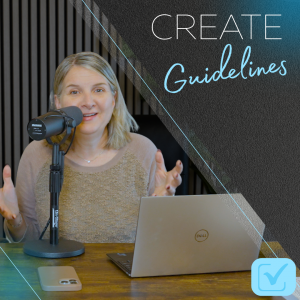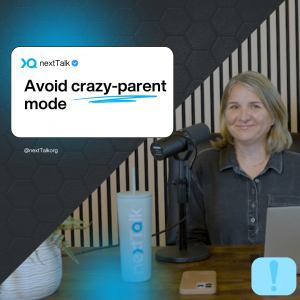
Menu
You’ve determined your kid is ready for a phone. It’s such a big decision, but you’re ready to take the plunge!
We’ll give you three suggestions on how to roll it out effectively with your child.
You’ve determined your kid is ready for a phone. It’s such a big decision, but you’re ready to take the plunge!
We’ll give you three suggestions on how to roll it out effectively with your child.












Transcription is done by an AI software. While technology is an incredible tool to automate this process, there will be misspellings and typos that might accompany it. Please keep that in mind as you work through it.
Speaker 1:
Welcome to the Next Talk podcast. We are a nonprofit passionate about keeping kids safe online. We’re learning together how to navigate tech, culture and faith with our kids. You’ve made the decision to get your kid a phone. I have a couple suggestions for you, and I know, with Christmas coming up or maybe a birthday, it’s the perfect time to gift your kid a phone, and so these are just a few things that I want you to think about, because I think rolling out a phone correctly can make a huge difference to keep your kids safe online. First of all, what I want to say is this show is not about if your kid is ready or not for a phone. We did a separate show about that that we’ll link but this show is specifically geared to parents who are saying, nope, my kid is ready, I’m getting them a phone. How do I roll it out? And so here’s a couple of suggestions that I have for you. Before we get into those, I do want to define what I mean by phone. So this is a phone with internet access, a smartphone. This is not social media. Social media is another beast. So when your kid first gets a phone, I do not advise that they get social media. They should have a trial period where they’re texting, they have a few apps and then they can earn one social media platform at a time as kids and parents learn it together and walk through it together. You hear us say a lot at Next Talk to teach your kid how to use a phone, like you’re teaching them how to drive. We don’t want to start out going 70 miles an hour down the highway in a free-for-all. So you know we start out teaching our kids how to drive in the driveway and then eventually turning out of our neighborhood and going 10 or 20 miles an hour. And so it is the same with getting a kid a phone. If your kid is getting ready to open up a phone on Christmas morning, it shouldn’t be a free-for-all where they download seven social media apps all at once. That’s way too much for you and your kid to manage. So that’s the first thing I want to say. This is not talking about social media. That’s an additional step, but they’re just getting a phone. What are some core things that we can roll out? So it’s a big step to take this leap of faith and give your kids a phone, and so we want to make sure we roll it out really, really well.
Speaker 1:
The first thing that I would recommend explain to your kid why they earned this phone. Write a letter to your kid and put it in the gift and it says hey, do you remember when you told me about your friend group that that that this happened? Do you remember when you were in the school bathroom and this happened and you told me about it? Do you remember, uh, three weeks ago, when you were playing Roblox and something really bad popped up on the screen and you told me these are the three reasons why you’re earning a phone, and so I think that’s really, really important, especially if you’re gifting to them on a birthday or a special occasion like Christmas, because automatically they think I’m just getting this because it’s a special occasion, and what we want to do is instill in our kids that they’ve earned this, that we are building a relationship of trust and, as long as they’re talking to us, this is what’s going to happen. They can earn more freedom because they’re growing up, and so I think this number one thing is so, so important.
Speaker 1:
Explain to your kid why they are getting this phone, why they earned it. Use tangible examples If you have implemented our red flag alert system or any of our family packed resources that we have, with all of those guidelines on what to report, and they report those things to you. That’s a conversation because you can say, hey, we have this thing hanging on the fridge where we tell you to tell us about all these different things that you may be seeing or hearing. You’re doing that. So because you’re doing that now you have earned a phone. So number one is explain to your kid why they earned that phone. Number two you have to create clear guidelines and expectations. So there have not been many times in my kid’s life where we actually set at the family kitchen table and I had them sign a document like signing a mortgage, but their phone contract was that. One time I laid out details of my expectations about that phone and they signed it and that was our phone contract. We have an editable version of that that will link as a resource that you can make it your own. It’s a starting point, but you can come up with your own guidelines that you can make it your own. It’s a starting point, but you can come up with your own guidelines that you want your kids Some of the things that I have included in, there is no phones in bedrooms or bathrooms.
Speaker 1:
Now, many of you guys have heard my story about the bathroom guideline and how that came to be. My five-year-old boy had walked in on me changing in the bedroom with an iPad and at that time I was in the beginning of Next Talk and learning what it means to keep your kids safe online and really looking for teachable moments that I could even have with my five-year-old about keeping him safe on his phone in the future, even though he had no phone at five, obviously. And so when he walked in on me changing, it was a light bulb went off in my head because I thought about all the research that I was doing around nude photos. I thought about young middle and high school girls that were telling me that they wanted to be asked for nude photos because it validated who they are, and so it clicked with me. Oh my gosh, my five-year-old is walking in on me and I’m not dressed.
Speaker 1:
Normally, old Mandy would just shoo him out of here and be like get out, I’m changing. New Mandy thought that’s a teachable moment with my five-year-old. I don’t need to overexpose him, but I can literally have a conversation with him about hey, bubba, you see that family iPad. It takes pictures. What if you would have taken a picture of mommy without clothes on? Bubba, we never take pictures of people without clothes on.
Speaker 1:
So from now on, we’re not going to bring the phone into the bathroom, because we don’t need phones in bathrooms and, in fact, anytime we’re undressing or taking a shower, we don’t need any type of camera in there, because we need to have a boundary in place. We don’t need a camera or a phone in there when we’re not dressed. That’s what I said to my five-year-old at the time. Now, what did I do there? I actually created a boundary in his mind that when you’re undressing, you don’t have screens present, and so those kinds of teachable moments are what we need to be teaching at five years old to prevent the nude photos at 15 and 16 and 17. But we’re missing it because we don’t realize that we need to teach these guidelines before they get a phone, and so, again, you need to when they actually do earn a phone.
Speaker 1:
You need to go over all of this. Hey, remember, we don’t have phones in bathrooms. This is why we don’t take pictures of naked people. We don’t have phones in the bedrooms. We don’t have phones behind closed doors. I also love the no phones in bedrooms at night. I love this conversation because one it’s scientific, like the American Pediatric Association even says you should turn off screens 30 to 60 minutes before bedtime. Your mind needs time to decompress before you go to sleep. The other thing too it’s just science that we need a good amount of sleep to function the next morning. If you’ve ever had a kid who is scrolling in the middle of the night, they may be performing badly in school, they may not be a good athlete, whatever it is, because they can barely function because they’re not getting sleep. What we want to do is instill in our kids that they understand how important that is, so that they make healthy choices with their phones. So when you’re giving your kid a phone, it’s the perfect time to create a phone contract and go over all these guidelines that you’ve already implemented in your home for years, some other guidelines we had we have no phones at meals, no phones behind closed doors and just conversation around it Like.
Speaker 1:
One of the things I’ve always said to my kids is your phone is not a diary. Anything you snap, post and share can be uncovered. Anything can be screenshot or recorded by another phone from a friend, and so nothing is ever really private. I’ve also, you know, we’ve had FBI cases where they can uncover disappearing pictures and so, just reminding your kids of that, nothing ever really disappears with technology, so your phone just should never be a diary. One of the things that I would say was, if you don’t want a parent, pastor or teacher to see, don’t do it on your phone. Just a good one-liner to help your kids understand the importance of that. And so you’re going to continue all of that, but you’re going to lay this out for them when they get that first phone and you’re going to create those guidelines and expectations. One thing I want to say about this say, your kid is 13, 14, or 15, and you’re giving them a phone and you’re rolling out these guidelines for them. Don’t get stuck in your guidelines, because what is a guideline for a 14-year-old may not be a guideline for a 17-year-old. I almost missed this, so I want to make sure that I’m passing on what I’ve learned here.
Speaker 1:
I remember looking at my husband one day when my daughter was 17 and a half and she was getting ready to go to college in six months, and I looked at him and said oh, she’s never had a phone in her bedroom at night ever, and so we’re going to send her off to college and her first time in a dorm room is going to be when she has that phone at night. So we caught her doing something amazing. She confided in us about something and she earned her phone in her bedroom at night, but this was six months before she was getting ready to go to college. I do not advocate that for younger kids and you can’t give more freedom if they’re lying to you. So we had had no problems. We had still been doing you know random phone checks and making sure and she was talking to us and all the things. There were no red flags. So she was earning more freedom by getting her phone in her bedroom at night. But that prepared her for college, for being out of our home and by herself and what it feels like to have a phone at night and just to be an advocate for yourself, that you have to choose to turn it off and stop scrolling, instead of mom or dad telling you to shut it off. Those are the kinds of tech decisions that we want our kids to make.
Speaker 1:
So this number two create clear guidelines and expectations are really, really important to implement when they’re first getting a phone. So number one explain why your kid earned it, so, so important. Number two create clear guidelines and expectations. Number three is this your kids are going to be exposed on a phone, so you have to monitor and talk. Now, here’s what I mean by that. If you don’t want to say the words pornography, sexuality, sextortion to your kids, they’re not ready for a phone because they’re going to be exposed to all of that. So we have to make sure that we’re saying those words.
Speaker 1:
If the kid is getting a phone and listen, I say this monitor and talk, monitor and talk. I’m all for random phone checks, being up in their business, especially at first. You’re going to be up in their business a lot at first when they first get a phone and then, as you learn to trust them, you won’t have to check as often. Right? We use the analogy of a kite. We’re letting the string out. They fly, they may make a mistake. You reel it in and then you teach the teachable moment and then you let out the string again. You let them have more freedom as they earn back the trust. So you’re going to be doing all these random phone checks. You’re going to be setting parental restrictions. You’re going to have their passwords. That’s all part of that monitoring piece. It’s all good, but with every one of those there’s loopholes. Restrictions are good, but it’s really about that relationship. So this third point when I say monitor and talk, the monitor is just part of it.
Speaker 1:
The talk is the bigger portion and again, we have so many resources here at Next Talk. If you do not have one of our family packs, download that this gets your kids. It outlines what are expectations of you to report to us. It also has expectations of parents on there saying we’re not going to go crazy parent mode. We’re going to stay calm when you tell us things, and so it’s a two-way street on those family packets and this is a new resource that we’ve created that we want you to use and utilize.
Speaker 1:
Christmas break and New Year’s is the perfect opportunity. You’re going to have time off of school, more family time. It’s a great time to reset the communication in your home. So, especially if your kids are getting a phone for the first time, you have the phone contract resource and you have these new family packs that you can come together and be like okay, we just need to be, we’re on the same page here. These are the kinds of topics that we’re going to be talking about and I need you reporting to me. So you’re getting your kid a phone, you’re wrapping it up. Three suggestions that I have for you. Explain why your kid earned it. Look your kid in the face. Write them a letter and say this is why. Because you’re confiding in me about this, this and this. You told me about this, this and this. Two create clear guidelines and expectations. Get that phone contract and number three. Monitor and talk. Get those family packs and be a household and a family that is committed to open communication where no topic is off limits. Make a donation today at nexttalkorg.
Speaker 2:
Next Talk. Resources are not intended to replace the advice of a trained healthcare or legal professional, or to diagnose, treat or otherwise render expert advice regarding any type of medical, psychological, legal, financial or other problem. You are advised to consult a qualified expert for your personal treatment plan.
This podcast is not intended to replace the advice of a trained healthcare or legal professional, or to diagnose, treat, or otherwise render expert advice regarding any type of medical, psychological, or legal problem. Listeners are advised to consult a qualified expert for treatment.
Subscribe to our monthly newsletter for all the latest podcast titles, events, and nextTalk news.
nextTalk started in a church with a group of parents who were overwhelmed that their young children were being exposed to sexualized content. Today, we’re a nonprofit organization in the state of Texas and an approved 501(C)(3) entity by the Internal Revenue Service.